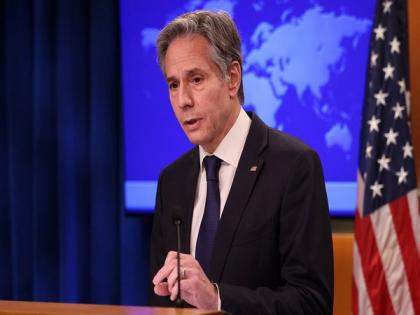China terms US 'master of coercion' after Blinken criticised Beijing for trade sanctions against Australia
By ANI | Published: February 11, 2022 10:50 PM2022-02-11T22:50:16+5:302022-02-11T23:00:18+5:30
China has termed the US 'master of coercion' after US Secretary of State Antony Blinken said that Beijing's trade sanctions on Australia have backfired on it and that the communist regime lost more than Canberra in its efforts to squeeze Australia economically.

China terms US 'master of coercion' after Blinken criticised Beijing for trade sanctions against Australia
China has termed the US 'master of coercion' after US Secretary of State Antony Blinken said that Beijing's trade sanctions on Australia have backfired on it and that the communist regime lost more than Canberra in its efforts to squeeze Australia economically.
"The label of "economic coercion" cannot be pinned on China. All attempts to gang up with others to misrepresent facts and resort to malicious hype-up are bound to fail," said Zhao Lijian, spokesperson for China's Foreign Ministry, on Friday during a regular press conference.
It came after Blinken recently in an interview with Australian media outlets said that China's trade sanctions on Australia have backfired and by standing up to Beijing, Australia "set an incredibly powerful example" for the world. "I think China has lost more than Australia has in its efforts to squeeze Australia economically," he said, adding that Beijing would be "thinking twice about this in the future"
Zhao on Friday said that with regard to coercion, no one has a better claim to the title of master of coercion than the US.
"Speaking of coercion, the US government forced the military government of Haiti to step down in 1994, and referred to that as a textbook example of coercive diplomacy," said Zhao.
The spokesperson also said that in 2003, the US explicitly characterized USD 30.3 billion additional military expenses for "coercive diplomacy" as incurred expenses.
"The US government went all out to hobble competitors like Huawei of China, Alstom of France and Toshiba of Japan and used coercion to force the Taiwan Semiconductor Manufacturing Co (TSMC), Samsung and other companies to provide chip supply chain data. These are textbook examples of economic coercion," he added.
"I would like to reiterate that China always proceeds from the lawful rights and interests of domestic industries and the safety of consumers," said Zhao, adding, " Beijing adopts appropriate measures on imported products in strict compliance with Chinese laws and regulations as well as WTO rules. This is fully justified, lawful and beyond reproach."
( With inputs from ANI )
Disclaimer: This post has been auto-published from an agency feed without any modifications to the text and has not been reviewed by an editor
Open in app